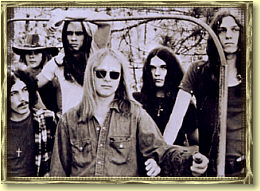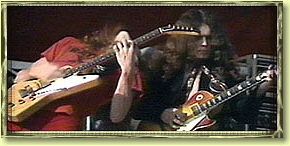| |
"The
Lynyrd Skynyrd Story" börjar väl egentligen
sommaren 1964 när Gary Rossington, Allen Collins och
Ronnie Van Zant började spela tillsammans för första gången.
Vid den tidpunkten spelade Gary Rossington(gitarr) i ett
band som hette "Me, You, and Him" tillsammans
med Bob Burns(trummor) och Larry Junström(bass)-vilken
sedemera blev medlem i 38 Special. Ronne Van Zant sjöng
för tillfället i ett annat band som hette "Us".
Allen Collins(gitarr) i sin tur plockade justa "southern
notes" i ett annat band som kallade sig för "Mods".
Både Allen Collins och Gary Rossington var runt 14 bast
(ett år till moppe) medan Ronnie Van Zant var ett par år
äldre.
Historien om deras första möte är ju rätt passande
med tanke på att gruppen under åren som komma skulle,
ådrog sig
ett välrennomerat rykte som "roughnecks".
Grabbarna gillade att lira baseball och en dag när
Rossington och Burns
satt och tittade på när dom äldre grabbarna spelade, så
råkade Ronnie slå ett slag som träffade Burns i
huvudet och
som golvade honom fullständigt. Efter spelet sökte
Ronnie upp dom andra grabbarna för att se om Burns var
ok.
Dom presenterade sig för varandra, gick sen hem till Bob
Burns och jammade några låtar tillsammans, och upptäckte
att det både lät och funkade bra, varefter dom bestämde
sig för att börja spela tillsammans.
Många år senare kommenterade Rossington det hela så här:
"That was it, that was the start of Lynyrd Skynyrd.
So if Ronnie wouldn't have hit that foul ball, there
wouldn't be no Skynyrd." (ja tur var väl det,,,
eller hur?)
(Fortsättningen är på engelska men allt skall översättas
framöver)
After a while, the group decided that they needed another
guitar player because, as Rossington put it, "I
didn't know barre chords real good, and the little amp
built into my guitar just wouldn't cut it. We knew this
little skinny kid, Allen Collins, who had a big amp and
knew barre chords. He was good, you know." So they
went looking for him. When they found him he was afraid
that Van Zant, who had a reputation as a brawler, was
going to beat him up. He ran from them, and they had to
chase him down. When he realized that they just wanted to
talk, he was so relieved that he agreed to try playing
with them. They took his amplifier over to the Burns'
garage, where, according to Rossington,"We stuck
both of our guitars in the bright channel, and Ronnie put
his microphone in the normal, so we were all three on one
amp, and Bob played drums. That was how it started."
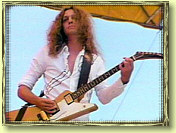
Allen
Collins |
For the next few years, under a
variety of names (The Noble Five, The Wildcats,
The One Percent, among others), the new band
played teen dens, church socials, and local juke
joints. Influenced by the British bands - the
Beatles, the Stones, the Yardbirds - the boys
grew their hair long, which in those days meant
barely brow-or ear-length. It was still long
enough to get them in trouble at school. To
comply with the dress code, they would slick it
back with vaseline for class, and comb it out
after school. But they had to shower after gym,
and their coach, Leonard Skinner, often caught
them literally with their hair down. That
resulted in so many trips to the principle's
office, and so many suspensions, that eventually
the boys quit school. They wanted to escape the
hassles, and to be able to devote themselves full-time
to the band. |
A few
days after Rossington, the first to quit, left school,
they played a gig at Jacksonville's Forest Inn. When he
introduced the band, Van Zant said, "We're the One
Percent, but we're gonna change our name tonight.
Everybody who wants to change it to Leonard Skinner,
applaud." The crowd knew the story, and they knew
Skinner - the applause was deafening. So the band kept
the name, changing the vowels to Ys in a token attempt at
anonymity.
The band's search for a place to work led them to an
isolated farm south of Jacksonville, near a town called
Green Cove Springs. The 99 acres of "cows and
mushrooms" contained a little wooden house with a
tin roof, which became known as the "Hell House",
with good reason. It gets very hot in Florida in the
summer, especially under a tin roof with no air
conditioning. (When the band later worked under stage or
screen lights, they took it in stride, and didn't seem to
sweat as much as other groups. They were used to the Hell
House temperatures of two hundred or so degrees, and
could, so to speak, take the heat.) It was here in the
Hell House that the sound of Lynyrd Skynyrd was born.
Working sun-up to sun-down,
writing and rehearsing, the band began to take
shape.
They won a Battle of the Bands in Jacksonville,
and landed their first tour, as the warm-up band
for Strawberry Alarm Clock.
The $50 a week that they earned on that tour was
twice what they had been making in Jacksonville (for
their very first gig, a private party in a
barbecue joint, the five members
of the band had made a grand total of $10, from
which they had to furnish gas money).
For the first time, the band assembled a road
crew. It included Kevin Elson, who later
produced "Journey", and mixed "Lynyrd
Skynyrd 1991".
By the fall of 1970, Skynyrd had not only a road
crew but a manager, Alan Waldon, brother of
Capricorn Records' Phil. He arranged for them to
record their first demos, at Quinvy Studios
outside Muscle Shoals, Alabama.
The band was trying to find its own voice, and
they did - one of the songs they recorded at
Quinvy was the original version of "Free
Bird". |
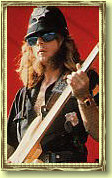
Leon
Wilkeson |
Jimmy Johnson of
Muscle Shoals Sound Studio was so taken with the Quinvy
demos that he offered to produce an
album for a percentage of the profit, if and when it was
sold. So Skynyrd borrowed money, and drove to the tiny
northern Alabama hamlet of Sheffield to record for him.
There were two series of sessions, in the spring and fall
of 1971. Bassist Leon Wilkeson joined them toward the end
of the second series.
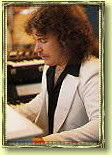
Billy
Powell |
Billy
Powell was one of their original roadies, until
Ronnie heard him playing the piano between
sessions one day. Asked why he had never
mentioned that he was a player, Powell responded
that he was happy to have a job as a roadie, and
had no ambition to play in the band.
Van Zant, however, had other ideas and before
long Billy joined Lynyrd Skynyrd.
Powell was one of the most musically educated of
the group, having taken piano lessons most
of his life.
Although Skynyrd was essentially a guitar band,
Powell was the one who laid down the musical
backgrounds on most of their songs.
It's hard to imagine, for example, what "Freebird"
would sound like without his keyboards. |
During
the Qinivy sessions, Johnson and his partner Tim Smith
taught the band how to record, starting with such basics
as putting the bass and drums together to form a rhythm
section. Skynyrd had to work whenever there was studio
time free, even if it was in the middle of the night, but
they were finally recording. During those sessions they
laid down the first multi-track version of "Free
Bird", as well as "One More Time", "I
Ain't the One","Trust", "Gimme Three
Steps", and twelve other songs. Ronnie
affectionately dubbed the Muscle Shoals studio crew
"The Swampers", and paid tribute to them on
"Sweet Home Alabama".
Although Alan Waldon shopped the Muscle Shoals tapes
around, he found no takers. Skynyrd returned discouraged
to Jacksonville, only to find that they weren't even
welcome to local bookers. They began to commute to
Atlanta, where they found a home base at Funnuchio's, one
of the roughest bars in the city. Although shootings and
stabbings were nightly occurrences, the band began to
play there regularly. They borrowed the money for these
trips from Van Zant's wife, Judy. (He had met her in 1969,
when the band were still calling themselves the One
Percent, and were playing mostly Cream and Creedence
covers. She was with him throughout his career, and had
this to say about marriage to a dedicated musician;
"I understood that his music was what was most
important to Ronnie. When you marry a musician, you have
to understand that their music is first and foremost.
It's a different way of life.")
It was at Funnuchio's in 1972 that Skynyrd ran into Al
Kooper, who was in the process of launching his MCA-backed
Sounds of the South label. Kooper had played with Bob
Dylan's first electric band on "Bringing It All Back
home", and was one of the forces behind Blood,
Sweat, and Tears. He also worked with Steven Stills and
Mike Bloomfield on the "Super Session" album.
Gary Rossington said, "Kooper was big-time to us, so
we were honored and freaked out that he was out in the
club listening to us. Then the next night, we looked out
and he was in the same seat, so after the gig we stopped
and said, "Hey, what's going on?" The upshot
was that Kooper offered the group a contract, and after
some initial hesitation, they accepted.
Unsure of his ability to handle
the big time, bassist Leon Wilkeson left the band.
In the search for his replacement, Ronnie
remembered Ed King of Strawberry Alarm Clock, and
somehow located him at the small bar in North
Carolina where he had been working.
King came down to the Hell House for a series of
frenzied rehearsals, and entered the studio with
the others for the Kooper-produced demos. These
were recorded at Studio One in Atlanta in one
live session that lasted until 3:00 AM. Of this
session, Kooper said,"We recorded everything
in one day onto two-track. They were so good, so
well-rehearsed, that we ended up using the stuff
that didn't go on the album for the B-sides of
the singles."
At this point, the band had a catalogue of almost
twenty songs. Deciding which ones to perform, and
how, made Skynyrd's sessions with their new
producer fairly tense.
Kevin Elson remembered that "there was
always a touch of tension. Al had a lot of
arrangement ideas and keyboard ideas that the
band didn't agree with initially - but I think
that the tension and arguing made for a better
record in the end. The band would never back down
from what they wanted, and Al didn't tend to back
down anyway. |
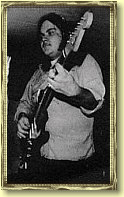
Ed King |
Kooper
himself said,"I taught them how to use the studio. I
also taught them how to use the bass and the bass drum in
a competitive way. But of all the bands I ever worked
with, they were the best-arranged. What they did with
guitar parts was truly amazing - they had the pulse of
the street. They absolutely had it. What fights we had
were over my editorial decisions, and I was often
outvoted. Ronnie ran that band with an iron hand."
Kooper's knowledge of modern recording techniques gave
the band new tools. A stand-out example is the overdubbed
track of "Free Bird", where Collins added a
second guitar part slightly behind his solo. This created
the dual guitar sound, reminiscent of Wishbone Ash's
"Phoenix", that climaxes the album.
"(pronounced 'leh-nerd skin'-nerd)" was
recorded at Studio One in Doraville, Georgia,(home base
for the Atlanta Rhythm Section) and engineered by the
brilliant Rodney Mills. Mills specialized in getting
guitars to speak for themselves, and no band ever offered
him a better opportunity. His work with Skynyrd began
with "Simple Man", and continued throughout
their career. Al Kooper was practically a member of the
band on "(pronounced)"; under the pseudonym of
"Roosevelt Gook" he played bass and mellotron
and sang back-up.
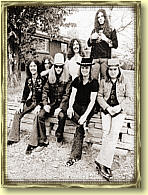
Lynyrd
Relaxing
|
Leon Wilkeson returned to the
group after the recording of "(pronounced)",
which allowed
Ed King to move from bass to guitar. When they
had worked out the new division of labor,
they found that Collins' stabbing Gibson
Firebird, Rossington's whining Les Paul, and
King's metallic Strat chops complemented each
other amazingly well. Although they had already
written most of the songs that would make up the
album, "Second Helping", the new line-up
resulted in a burst of creativity.
"Sweet Home Alabama" was written even
before the first album was released.
In July of 1973, Kooper's Sounds of the South
label gave a party for the music industry at
Richard's, an up-scale club in Atlanta, to
introduce three southern bands. One of them was
Lynyrd Skynyrd. They had written a song, "Workin'
for MCA", just for the occasion, which went
over well with the crowd. MCA signed them for $9,000,
almost all of which they spent
on new equipment.
The Who's Peter Townsend had heard and liked
"(pronounced)", and he got Who manager
Peter Rudge to sign Skynyrd to open for them on
the "Quadrophenia" tour. Skynyrd were
used to playing small clubs, to audiences of two
to three hundred people, and opening night found
them facing a crowd of 20,000 at the Cow Palace
in San Francisco. |
They were
terrified, and decided to cope with it by getting as
drunk as possible. They tore through their five-song,
twenty-minute set in a state of panic, but the crowd
liked them, and they got good write-ups. The band did
well on that tour, and even managed to earn encores,
which was quite a feat for a little-known band in the
face of a rabid Who crowd. About halfway through the
tour, Peter Rudge approached the group with an offer to
become their manager. They agreed, and left Alan Waldon.
In spite of the fact that "Free
Bird" was dominating the FM stations, and in
spite of the critical success of their first
album, neither "(pronounced)" nor its
single,
"Gimme Three Steps", made any impact on
the charts. When Kooper took the band into the
Record Plant studio in Los Angeles to begin
recording the second album, everyone was feeling
the pressure to produce a Top Forty hit.
It didn't help that the atmosphere in the LA
studio was very different from what they
were used to. Kevin Elson recalled, "The
problem was that we were in one studio, the
Eagles were in another, Stevie Wonder was
recording in a third, and John Lennon and Jackson
Browne were walking around. The band just felt
really unnerved a lot of the
time, especially the day that John Lennon walked
into our control room.
They all froze - that was the end of work that
day." |
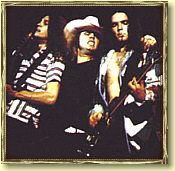
Allen
Ronnie Gary |
Van Zant
wanted to record "Sweet Home Alabama" as "Second
Helping"'s single, but both Kooper and the MCA brass
thought it was too regional. They opted for "Don't
Ask Me No Questions" instead. In fact "Don't
Ask Me ..." didn't do well, and three people from
the MCA promotion department decided to push "Alabama".
MCA's southern promotion team of Jon Scott, Mike
Scherlock, and Leon Tsilis got Top Forty stations to
start playing the song, and it became an enormous hit in
the southern states. The popularity of the song kept
growing, and eventually MCA couldn't ignore it any longer.
They released "Alabama" as a single in June of
1974, and it became Skynyrd's only Top Ten single,
peaking at number 8. By September, both "Alabama"
and "Second Helping" were gold records,
followed in December by "(pronounced)".
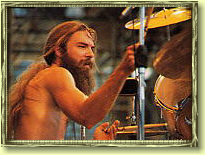
Artimus
Pyle |
The success of "Alabama"
had another consequence; it identified Skynyrd as
a "Southern Band"; MCA's decision to
add a Confederate flag to their live stage
backdrop completed the image. The common
conception is that Ronnie Van Zant was some kind
of Dixie reactionary, but the truth is that his
lyrics express the frustrations and aspirations
of the downtrodden everywhere, not just of the
South.
There is something traditionally Southern,
however, about the way his outrage was often
mixed with humor, a wry blend that has been
characteristic of the region since the loss of
the War of Northern Aggression.
Lynyrd Skynyrd toured extensively in support of
their first two albums, and it became too much
for Bob Burns. Pleading exhaustion, he left the
band, and was replaced on drums by Artimus Pyle. |
When the
group went into Webb IV Studios in Atlanta in January of
1975, they had only one song ready for recording. This
was "Saturday Night Special", which Burns had
recorded with them before his departure. In 21 days,
averaging 16 hours a day, they managed to crank out seven
more songs, but the quality of the material was a sad
falling-off from the previous albums. There was a reason
that Van Zant named this one""Nothin' Fancy".
The band went on a 90
day, 61 date, "Torture Tour" in support of the
album. Although it was a commercial success, the tour
left a trail of fistfights, wrecked hotel rooms, sloppy
performances, and cancelled dates. Van Zant said of this
tour,"We were doing bottles of Dom Perignon, fifths
of whiskey, wine, and beer. We couldn't even remember the
order of the set; some guy sat crouched behind an amp and
shouted it at us. We made the Who look like church on
Sunday. We done things only fools would do." Halfway
through the tour, Ed King left the band, unable to cope
with the pace and the lifestyle. Collins and Rossington
divided King's parts for the remainder of the tour.
|
|
